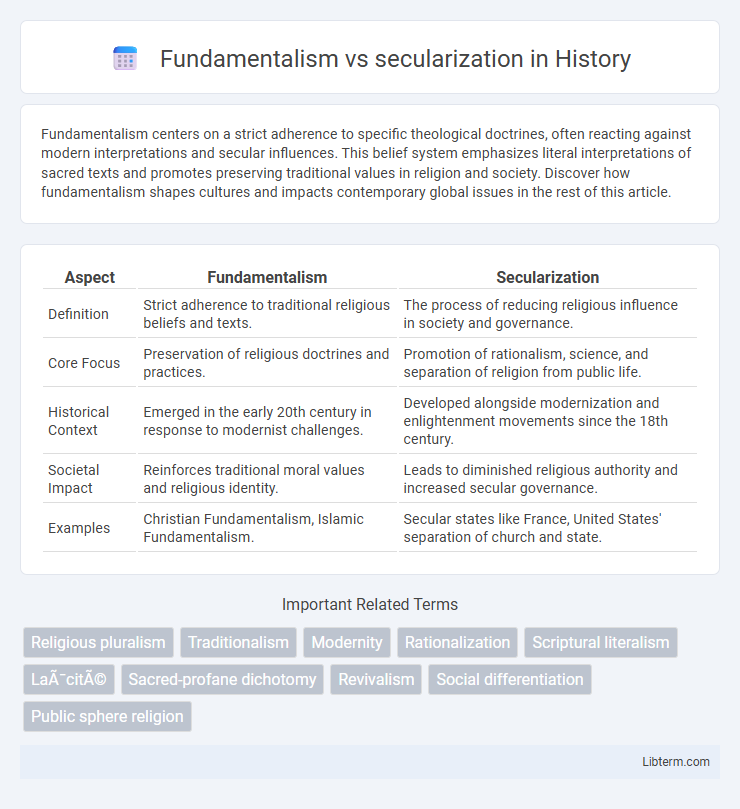Fundamentalism centers on a strict adherence to specific theological doctrines, often reacting against modern interpretations and secular influences. This belief system emphasizes literal interpretations of sacred texts and promotes preserving traditional values in religion and society. Discover how fundamentalism shapes cultures and impacts contemporary global issues in the rest of this article.
Table of Comparison
| Aspect | Fundamentalism | Secularization |
|---|---|---|
| Definition | Strict adherence to traditional religious beliefs and texts. | The process of reducing religious influence in society and governance. |
| Core Focus | Preservation of religious doctrines and practices. | Promotion of rationalism, science, and separation of religion from public life. |
| Historical Context | Emerged in the early 20th century in response to modernist challenges. | Developed alongside modernization and enlightenment movements since the 18th century. |
| Societal Impact | Reinforces traditional moral values and religious identity. | Leads to diminished religious authority and increased secular governance. |
| Examples | Christian Fundamentalism, Islamic Fundamentalism. | Secular states like France, United States' separation of church and state. |
Introduction to Fundamentalism and Secularization
Fundamentalism emphasizes strict adherence to established religious doctrines, often reacting against modernity and secular values. Secularization refers to the process by which religion loses social and cultural significance, leading to the separation of religious institutions from state and public life. The tension between fundamentalism and secularization shapes contemporary debates on religion's role in society, governance, and identity.
Historical Origins of Fundamentalism
Fundamentalism emerged in the early 20th century as a reaction to modernist interpretations of religion, particularly in the United States with the publication of the pamphlet series "The Fundamentals" between 1910 and 1915. This movement sought to reaffirm literal interpretations of sacred texts and counteract the secularization trends driven by scientific advancements and critical biblical scholarship. Rooted in Protestant Christian contexts, fundamentalism's historical origins reflect a broader response to cultural and intellectual shifts challenging traditional religious authority.
The Rise of Secularization in Modern Societies
The rise of secularization in modern societies is marked by the decline of religious authority and the increasing influence of scientific reasoning and rational thought in public life. This shift results in social institutions, such as education and government, prioritizing secular values over traditional religious doctrines. Data indicates a significant decrease in religious affiliation and practice in Western nations, correlating with urbanization, technological advancement, and higher education levels.
Core Beliefs of Fundamentalist Movements
Fundamentalist movements emphasize literal interpretations of sacred texts, strict adherence to traditional doctrines, and rejection of modernist influences that challenge established religious values. Core beliefs often include the inerrancy of scripture, moral absolutism, and the necessity to restore perceived original purity and authority of the faith. These convictions contrast sharply with secularization processes which promote separation of religion from public life and encourage pluralism and rationalism.
Key Drivers of Secularization
Key drivers of secularization include urbanization, which fosters diverse social interactions and weakens traditional religious authority, and scientific advancements that promote empirical reasoning over faith. Increased education levels encourage critical thinking and skepticism toward religious dogma, while modernization and economic development shift societal values toward individualism and material success. Furthermore, the rise of pluralism in multicultural societies challenges exclusive religious claims, leading to a more secular public sphere.
Clash of Values: Tradition vs. Modernity
Fundamentalism staunchly upholds traditional religious values and norms, often resisting the progressive changes associated with modernity, such as secular laws and scientific advancements. Secularization promotes a society where religion plays a diminished role in public life, emphasizing rationality, individual autonomy, and pluralism in social and political institutions. The clash of values between fundamentalism and secularization centers on the tension between preserving historical religious identity and embracing contemporary secular principles that prioritize innovation and inclusivity.
Fundamentalism and Political Influence
Fundamentalism significantly shapes political landscapes by mobilizing base voters around strict religious doctrines, often influencing legislative agendas and judicial appointments. Political movements rooted in fundamentalist ideologies prioritize policies aligned with moral absolutism, impacting issues such as education, reproductive rights, and freedom of speech. This influence intensifies in regions where religious identity intertwines closely with national identity, amplifying fundamentalism's role in shaping governance and public policy.
Secularization’s Impact on Culture and Morality
Secularization transforms culture by encouraging rationalism and scientific thinking, reducing the influence of religious doctrines on social norms and values. It promotes individual autonomy and pluralism, leading to diverse moral frameworks that prioritize human rights, equality, and personal freedoms. This shift often results in decreased adherence to traditional religious practices and a redefinition of moral standards aligned with secular ethics.
Fundamentalism in the Age of Globalization
Fundamentalism in the age of globalization emerges as a reaction to rapid cultural, economic, and technological changes that threaten traditional identities and beliefs. This resurgence often manifests through strict adherence to religious doctrines, aiming to preserve a sense of community amidst increasing secular influences and global interconnectedness. Fundamentalist movements utilize global communication networks to spread their ideologies, reinforcing group boundaries and resisting the homogenizing effects of secularization.
Future Trends: Balancing Faith and Secularism
Future trends in fundamentalism versus secularization reveal a complex interplay where societies strive to balance deeply rooted religious convictions with growing secular values. Technological advancements and global connectivity influence diverse populations, creating both challenges and opportunities for dialogue between faith-based groups and secular institutions. Policymakers increasingly focus on inclusive frameworks that respect religious freedoms while promoting secular governance to foster social cohesion and mitigate polarization.
Fundamentalism Infographic

 libterm.com
libterm.com